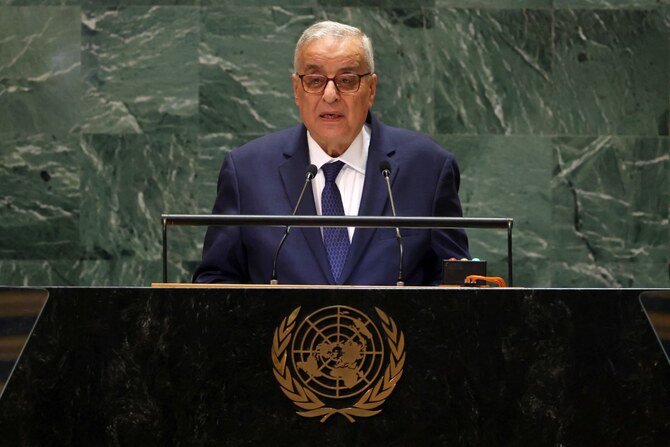NEW YORK CITY: Lebanon’s foreign minister on Thursday stressed the urgent need for international intervention to address the crisis in his country, which has seen Israeli attacks kill 700 citizens since Monday.
“Lebanon is currently enduring a crisis which is threatening its very existence,” Abdallah Bou Habib told the UN General Assembly.
The crisis “will transform into a black hole that will engulf regional (and) international peace and security” if the world continues to remain “immobile,” he said.
Bou Habib welcomed the joint declaration by the US and France on Wednesday for a 21-day ceasefire between Israel and Hezbollah, and demanded that all possible measures be adopted for it to be implemented.
He said what Lebanon is experiencing is “a consequence of the absence of a lasting (and) sustainable solution,” and “not the cause of an absence of a sustainable solution. The cause is the occupation.”
Despite the UN’s inability to protect Lebanon from Israeli aggression, Bou Habib said his country remains committed to the organization’s role as a “frontline of defense.”
Lebanon has repeatedly made efforts for peace, he added, citing the 2022 maritime demarcation deal and the country’s proposed framework for peace along its border with Israel.
However, “Israel has continuously eluded the issue or disregarded the matter,” which is why “we’re seeking refuge in the decisions under international law,” he said, reiterating Lebanon’s call for a “ceasefire on all fronts.”
Bou Habib also asked for international support in “reinforcing the deployment of the Lebanese army south of the Litani River,” and delivering equipment needed to increase troop numbers in the area.
He emphasized Lebanon’s commitment to peace and security, saying despite its economic crisis, the government has decided to send 100,000 additional soldiers to the south of the country.
He expressed gratitude for the UN Interim Force in Lebanon, which has “significantly contributed to stability and peace in the region” since its inception.
“Has Israel not had enough of the endless war since 1948? When will it be time for Israel to give a real opportunity for peace?” Bou Habib asked.
He said Lebanon and other Arab countries have “clearly, without any ambiguity, categorically embraced peace” through the Arab Peace Initiative in 2002, and it is now “incumbent upon Israel” to choose peace and break the cycle of violence in the region.




























